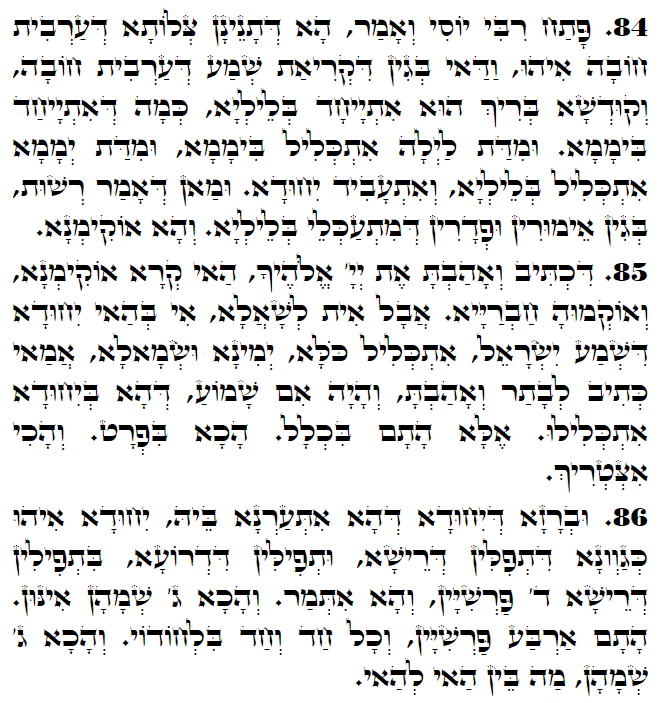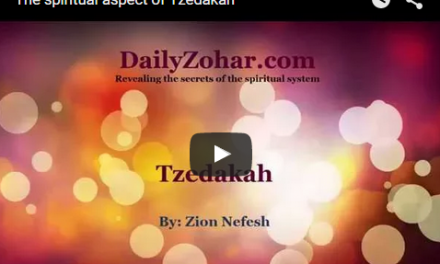Daily Zohar # 3118 – Vaetchanan – Love and obey your unity with God

.
Hebrew translation:
85. שֶׁכָּתוּב וְאָהַבְתָּ אֵת ה’ אֱלֹהֶיךָ. פָּסוּק זֶה בֵּאַרְנוּ, וּפֵרְשׁוּהוּ הַחֲבֵרִים. אֲבָל יֵשׁ לִשְׁאֹל, אִם בַּיִּחוּד הַזֶּה שֶׁל שְׁמַע יִשְׂרָאֵל נִכְלָל הַכֹּל, יָמִין וּשְׂמֹאל, לָמָּה כָּתוּב אַחַר כָּךְ וְאָהַבְתָּ, וְהָיָה אִם שָׁמוֹעַ, שֶׁהֲרֵי בַּיִּחוּד נִכְלְלוּ? אֶלָּא שָׁם בִּכְלָל, כָּאן בִּפְרָט, וְכָךְ צָרִיךְ.
86. וּבְסוֹד הַיִּחוּד שֶׁהֲרֵי הִתְעוֹרַרְנוּ בוֹ, יִחוּד הוּא כְּמוֹ תְפִלִּין שֶׁל רֹאשׁ וּתְפִלִּין שֶׁל זְרוֹעַ. בִּתְפִלִּין שֶׁל רֹאשׁ יֵשׁ אַרְבַּע פָּרָשִׁיּוֹת, וַהֲרֵי נִתְבָּאֵר. וְכָאן שְׁלֹשָׁה שֵׁמוֹת הֵם. שָׁם אַרְבַּע פָּרָשִׁיּוֹת, וְכָל אַחַת וְאַחַת בִּלְבַדָּהּ. וְכָאן שָׁלֹשׁ שֵׁמוֹת. מַה בֵּין זֶה לָזֶה?
.
Zohar Vaetchanan
#84
The evening prayer is called ’ערבית’, ‘Arvit’ and a must-do because we recite the Shema prayers that create the unification with the Holy One Blessed be He. We recite the Shema also during the day for unification. It means that the Shema prayer connects the night to the day and the day to the night.
There are thoughts that the Arvit prayer is optional because of the afternoon sacrifices in the Holy Temple were burning on the altar throughout the night and there was no aspect of separation that requires unification.
The morning prayer, ‘Shacharit’ is against the sacrifice offering of type ‘Tamid’ (means ‘Always’) that is a must-do in the morning. The afternoon prayer, ‘Mincha’, was also against the ‘Tamid’ sacrifice of the afternoon. The other offerings that connected the afternoon and the night were optional and that raises the thought that the Arvit prayer is optional.
#85
Deuteronomy 6:5
“וְאָהַבְתָּ, אֵת יְהוָה אֱלֹהֶיךָ, בְּכָל-לְבָבְךָ וּבְכָל-נַפְשְׁךָ, וּבְכָל-מְאֹדֶךָ”
“and you love YHVH your God with all your heart and with all your soul and with all your might.”
‘And you love’ that begins the first paragraph of the Shema prayer, is the aspect of the Right. ‘And if you obey the commandments’, of the next paragraph of the Shema (Deuteronomy 11:13), is the aspect of the Left.
The question that arises here is; if we had the unification of Right and the Left with the first verse of the Shema then why to follow again with the paragraphs for Right and Left. The Zohar explains that the first verse is the aspect of the ‘Whole’ and the following two paragraphs are for Chessed and Gevurah with the aspect of ‘details’.
#86
The unification of the Shema is like the unification between the Tefillin of the head and the Tefillin of the hand. In the Tefillin of the head, we have four Torah parts (See #41, https://dailyzohar.com/daily-zohar-2491/ – https://dailyzohar.com/daily-zohar-2493/).
In the Shema, there are three names יְהוָה אֱלֹהֵינוּ, יְהוָה, YHVH, ELOHENU, YHVH. The four Torah parts are in separate chambers of the head Tefillin. The question is why the Shema has only three names.
Continued in the next DZ
{||}

 Previous: Vaetchanan
Previous: Vaetchanan

